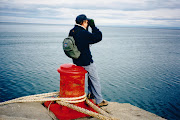I was with my father the day he was castrated. Not like a young bull in heavy summer when flies would swarm around the open wound in chaotic patterns of gnawing. Not with a sharp knife, a clean cut slicing the scrotum as neatly as a tab of butter. There was no ritual, no blood offering in a brass cup, no chants or blessing, no hands outstretched in a bowl of taking. There were no women swaying hip to hip outside his tent, waiting for the first taste of fertility beating raw outside a body. There was a gray carpet, a bank of televisions tuned to CNN, a receptionist behind Plexiglas, a nurse who called his name and escorted him through a door so he could be weighed first, then recorded on a chart. I sat in the waiting room with my purse in my lap. I counted tiles. I'd felt the needles pushing beneath the rice paper skin of his bicep, five tiny implants, five points of a hormonal star exploding. I counted tiles.
My father came back ten minutes later. His shoulders dipped south as he shuffled toward me. "All done?" I asked, and the corner of his mouth lifted enough to answer, to say he was more than done. In his neck, I could see the map of his veins, a mountain pass of blue roads falling into disrepair, coming to dead ends. I had spent twenty-one days clearing the underbrush from those roads, fighting to prove to my father that he was strong enough, that he could survive. I had held his hand when doctor number one with a degree from Columbia explained the radiation treatment. I had rubbed the soft spots behind his ears when doctor number three with the bedpan face listed the side effects of the chemo drug. I had stopped mentioning the disease. Words left me.
Our walk to the car was quiet. He ambled over to the driver's side, though I asked him if he wanted me to drive. He stuck the key in the ignition, but didn't turn on the engine. Outside, a pair of young trees bent in the wind that had picked up since morning. Their branches clattered together, shook a curl of leaves onto the windshield. My father began to cry.
"It's my fault," he said, his body rolling into itself as if to keep warm. "It's my fault." I protested softly, but my father, who had barely said ten words a day since he was diagnosed, was startlingly clear, almost adamant. "I've ruined her life."
For a moment, I wished he was an Alzheimer's patient and couldn't remember, wished that my mother was a blur in the blink of his eye. She blamed him for getting sick. She blamed him for the weight of his eyelids, for a tongue so thick his speech was curdled. She blamed him for having to come to this office today, for becoming less than a man, for taking away her sex life with the hormone therapy that made no promise to heal.
Yet my father stayed. He slumped in his easy chair with his head cradled in his hands and worried about how this woman who had slept with him for forty-one years was going to survive without him.
The tears beaded in the thread between his lip, spilled down to his chin. I took him in my arms, rocked this man who had shown me how to draw a horse with a piece of charcoal and taught me how to swim in the backyard pool. This man who hummed beneath his '75 Datsun on the weekends and came home every night in a tie at six-thirty. This man whose hands were once large enough to hold a baby bunny found on the back porch. This man.
Michelle Lee
Port Orange, Florida
Subscribe to:
Post Comments (Atom)













Wouldn't expect any less than perfection from this writer and a woman I've proud to call "friend." Michelle's words, which describe the grief she feels for her father's loss, are hauntingly beautiful and poignant. I was touched by the true story and wish it were only fiction. Her father is a wonderful man whose life has been forever changed.
ReplyDelete